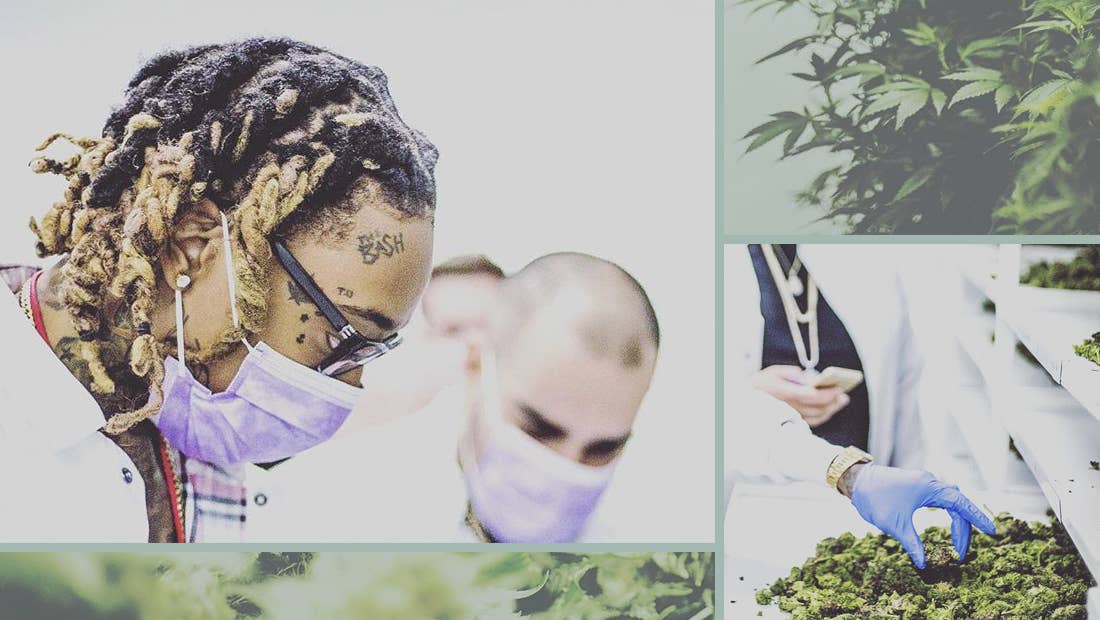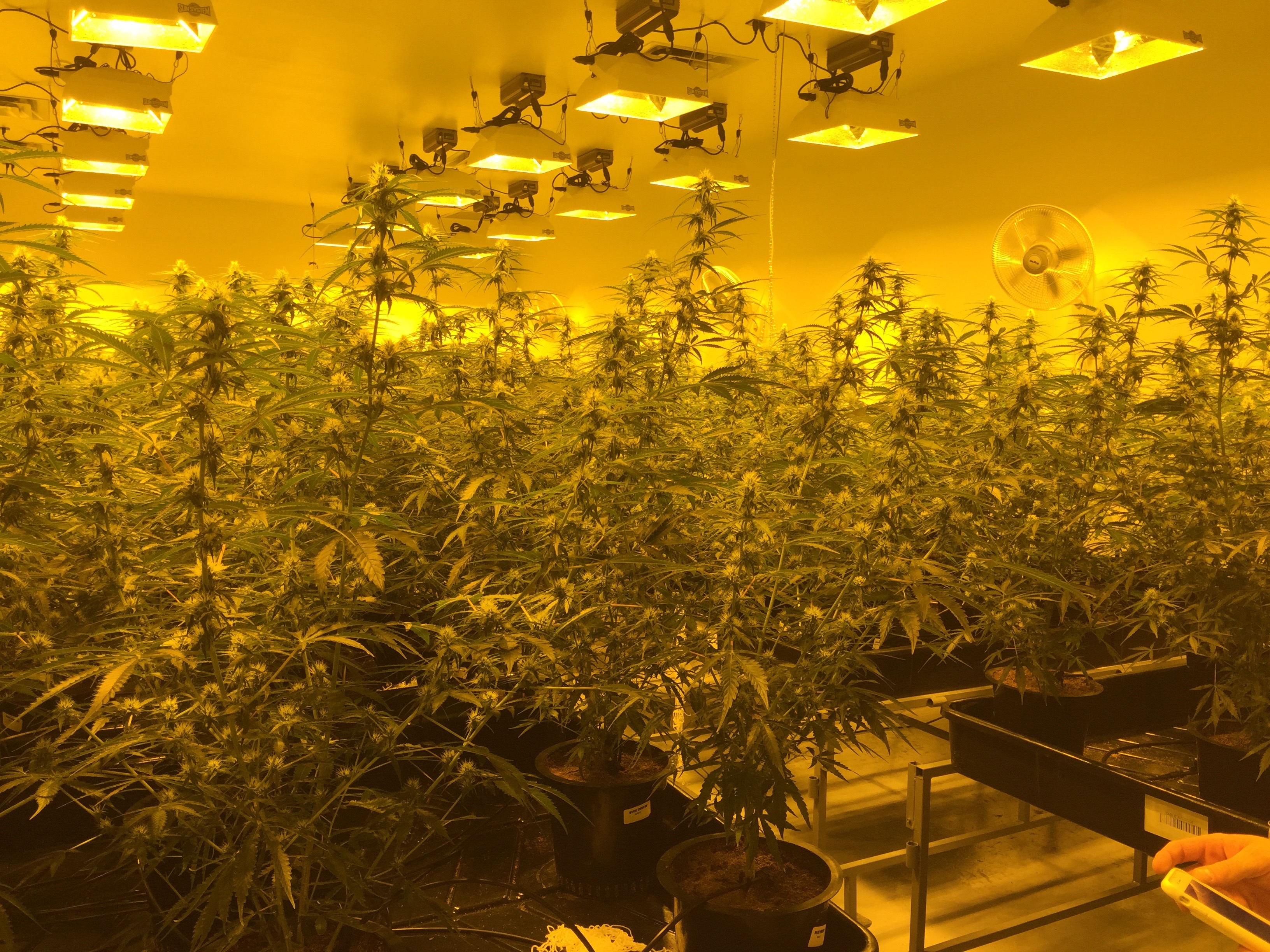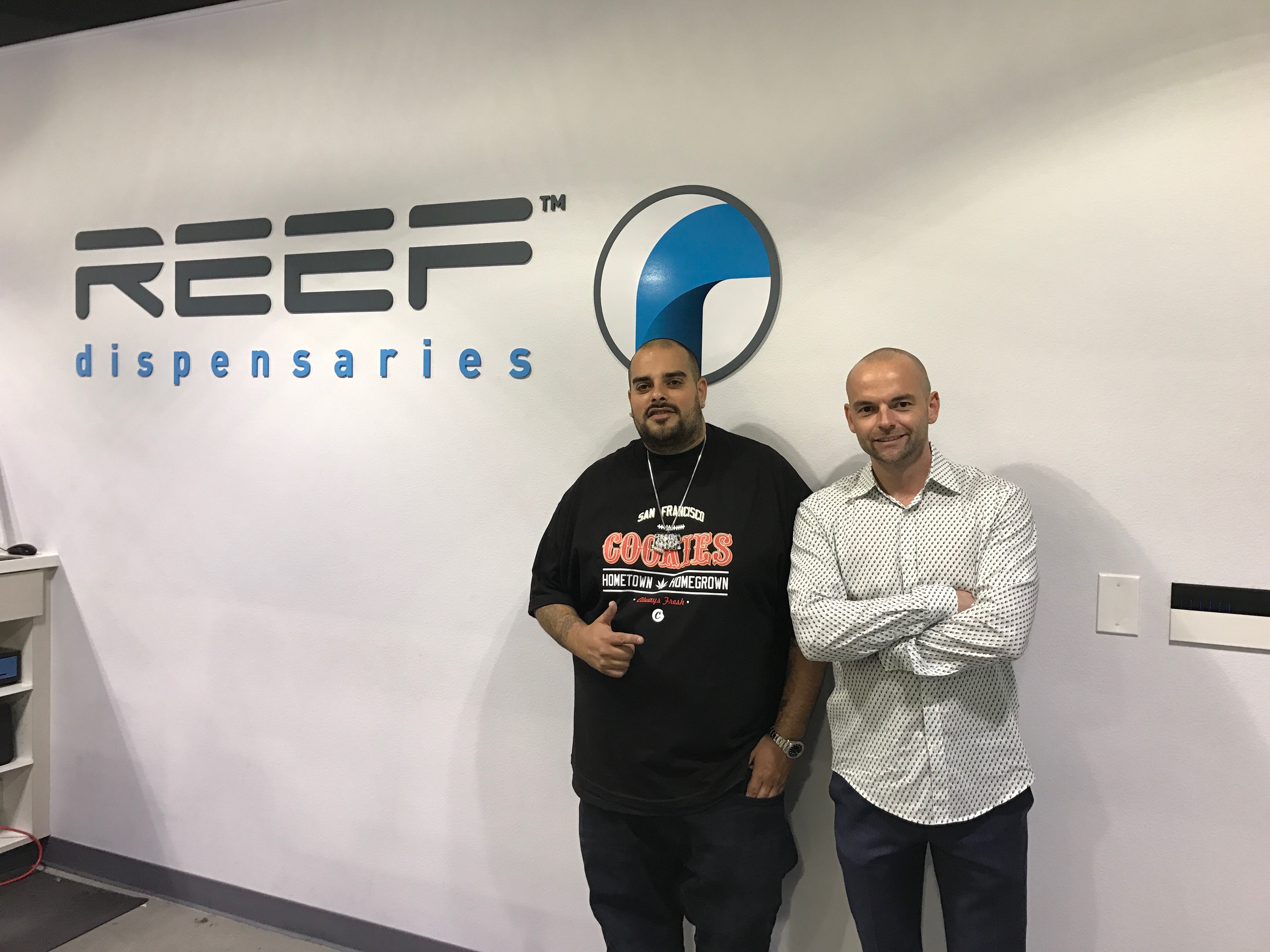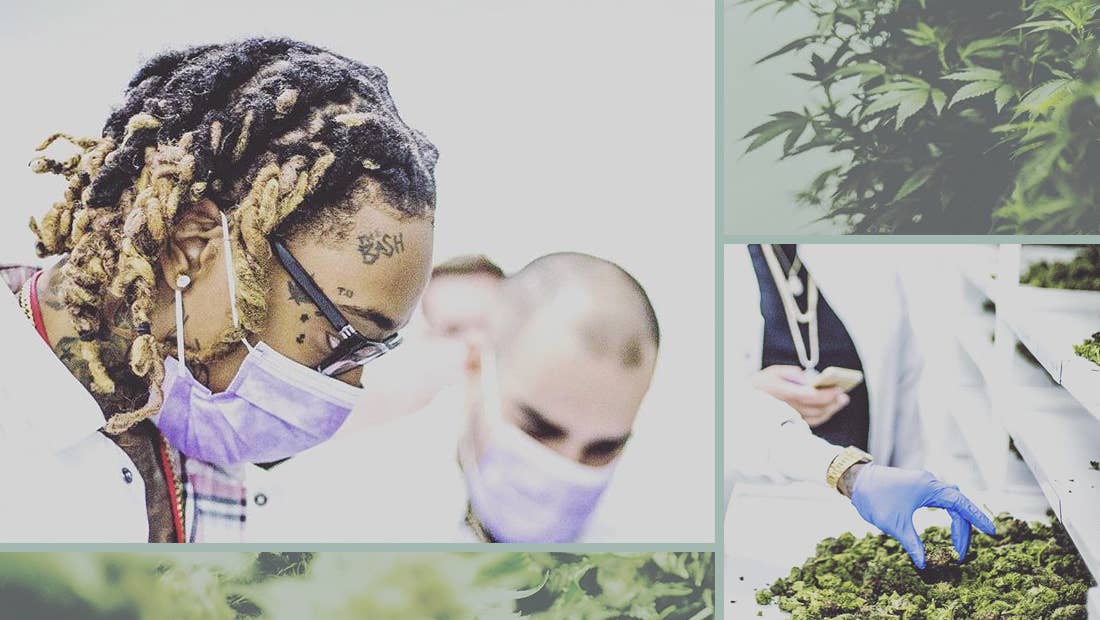
Over the past few years, states like California have blazed new trails with their lenient laws on marijuana use. That was particularly evident on Friday (Oct. 21), when Wiz Khalifa made headlines by cavalierly offering handfuls of Khalifa Kush—a new marijuana strain endorsed by the rapper—to West Hollywood paparazzi posted up outside a restaurant. With the election merely days away, Wiz may soon be able to perform similar acts of charity in Las Vegas as well, without fear of breaking the law.
This November, Nevada—along with four other states—will vote to legalize marijuana for recreational use. It’s currently legalized for medicinal use in the state, but if this referendum passes, Nevada will join just four other states (Alaska, Oregon, Colorado, Washington), along with the District of Columbia, where marijuana can be enjoyed recreationally without penalty. Tourists and convention-goers already descend upon Nevada to indulge in some of the state’s other freedoms, namely gambling and prostitution, and they may soon be able to add smoking weed to that list.
Highly anticipating the vote is Matthew Morgan, founder of Tryke Companies, which does business in Las Vegas as Reef Dispensaries, one of the country’s largest marijuana growth and distribution facilities. Located next door to the Spearmint Rhino gentleman’s club, the 165,000 square foot compound is larger than a Costco or Sam’s Club, showcasing an incredibly streamlined operation that includes the cultivation, production, extraction, and sale of marijuana products. Uniquely, in Nevada, there is not a limit to how many marijuana plants can be housed under one roof, so Reef is one of the few establishments in the country where all of these processes happen at the same location.
Tryke also happens to be the exclusive manufacturer of the news-making Khalifa Kush, a strain of ganja also known as K.K, which caused a bit of a stir at the top of the year when Wiz name-dropped it on Twitter.
“Hit this kk and become yourself," the Pittsburgh rapper tweeted, accidentally firing the first shot in a heated 24-hour beef with Kanye West, who assumed Wiz was talking about his wife, Kim Kardashian. After the dust settled, it was made clear that Wiz was only promoting his brand. Still, he couldn’t have asked for better publicity.
“The Kanye shit, it kind of helped it a little bit, but it’s been popping in the sense that [Khalifa Kush] has been floating around Northern and Southern California for a while. All that did was solidify it,” says Berner, a member of Wiz’s Taylor Gang crew who has partnered with Reef as a brand ambassador and product curator.
“I have a lot of knowledge of strains that perform well, that grow well, branded strains and what would be considered comparable to what’s on the market now,” Berner adds, explaining his role with the company. “I came in and looked at a bunch of the strains they had in Las Vegas and just put together a nice menu.”
That menu is the extent of what most of the public sees when they enter the storefront side of Reef Dispensaries: a quaint, wooden-table-filled room no bigger than a studio apartment, featuring everything from edibles to the exclusive dispensary sale of Berner’s Cookies clothing line. The shop’s design asthetic takes a page from the Apple Store, of which owner Morgan says he’s a “big fan.” But beyond a key-carded door is what the public does not see: millions of dollars of untouched product, what the United States government still refers to as contraband.
Matthew Morgan, 31, got his start in the bud business after spiraling out of the real estate game following the 2008 financial crisis. Having grown up on a Montana farm, he started “messing around” in his garage, and within 10 months “had a pretty sizable cultivation.” Unfortunately, the state reversed its lax marijuana laws in 2012, forcing him to shut the business down prematurely. That same year, he then started a similar company, Bloom Dispensaries, in Arizona, which remains one of the largest weed dispensaries in the country. Soon he was approached by a private investor from Florida (who wishes to remain anonymous) leading to the creation of Tryke Companies and Reef Dispensaries. They currently have five retail locations throughout Nevada and Arizona.
The last eight years of trial and error are what ultimately led to the massive Reef Dispensaries building in Vegas, a structure filled with several security checkpoints and, at any given time, a handful of the company’s 60 employees dressed in surgical garments, gloves, masks, and hairnets.
“Employees have to change into scrubs and shower before and after they come into work—pest control,” says Morgan. These measures are taken to keep out everything from common insects, like crickets and grasshoppers, to more ominous conditions, such as leaf septoria and tobacco mosaic virus.
Past the security checkpoints is what Morgan calls the “life-cycle of a plant,” beginning in the propagation room, where tiny sprouts sit in fertilizer, much like you’d see at a nursery. Because it is still illegal to transport marijuana seeds or plants across state lines, in-house cloning is how Tryke reproduces the product, with over four to six thousand clones on site at any given time.
“We have a large mother plant. We scrape some of the stigmata wall off it, put in a rooting hormone, and put it in ideal conditions,” Morgan explains. “Seven-to-12 days later it pops roots out and you have an identical clone from the plant you took it from. Takes the guess work out of it. You know exactly what product you are going to get every single time.”
After that, there’s a large yellow-lit room filled with marijuana plants as far as the eye can see—a surreal sight no matter how much Narcos you’ve watched. Walking though that room, Morgan explains the growth process: “These buds will get so big that they start snapping the branches off. So you put a netting in here to hold these up as they mature and get larger,” he says. “They would never get that large in Mother Nature, but we’ve created a perfect environment.”

"They would never get that large in Mother Nature, but we’ve created a perfect environment." — Matthew Morgan, founder of Tryke Companies
Other intricacies are revealed deeper into the compound. For example, the plants only use 10 percent of the water they are fed, so there is a water reclaiming system that recaptures the unused liquid and feeds it back to them later. The site uses four-and-half megawatts of power—about a quarter of what a typical casino uses—so there’s no air conditioning. Instead, a centralized cooling system maintains a cool temperature. Finally, giant gas tanks inject each room with CO2 to enhance the environment, giving the plants the best possible conditions to grow.
The engineering brilliance of the operation is reminiscent of Walter White’s underground car wash lab in Breaking Bad. Morgan says he gets the comparison a lot, but he and his team designed the facility from scratch.
“There’s really no one else to mimic or emulate. We had to kind of fit all of these pieces of the puzzle together that nobody has really ever put together before,” he says. “If I wanted to start a casino, for example, I have a lot of examples to go off of. For this, I didn’t really have anyone to look to. I have specialists in almost every area in-house, and then we brought in architects, engineers, and stuff like that. Scientists or horticulturalists say what they need, then we have engineers, architects, or whoever try to make those needs happen.”
In the deepest part of the facility is the cure room, where a few hundred bins line a series of shelves. Inside each of those bins is about a thousand nuggets of weed, or at least enough to fill the average gumball machine.
Given that much desirable product in-house, Reef Dispensaries’ home base has alarm buttons for fire, police, and paramedics on each door. Additionally, there’s round-the-clock security and a K9 unit.
“I’ve never had a security issue in eight years now. We take a lot of security protocols and measures to keep our employees safe, as well as make sure there is no product running outside the front door,” Morgan says bluntly.
Safety isn’t his only concern, though. There’s also the law. Marijuana has been legal in Nevada for the past decade for medicinal use, but recreational isn’t—yet. Nonetheless, dispensaries like Reef, Euphoria Wellness, and Medizin have sprouted up across the state in hopes that the Election Day referendum will open up a new market for them.
“They put a law into effect 10 years ago to help patients gain access to medical cannabis, but there was no legal outlet necessarily to gain access to it,” Morgan explains. “I think Nevada looked around the country at all of the other programs and how well they were doing and felt that they could implement something similar using the regulations of the gaming model.”
"Now, over 50 percent of Americans would like to see marijuana legalized." — Matthew Morgan, founder of Tryke Companies

"I'm excited Nevada has jumped on board with the new laws. Everyone who lives in or visits Vegas with a medical card can now enjoy KK," Wiz Khalifa tells Complex.
Yet at the top of August, the federal government re-declared marijuana as a Schedule I controlled substance, leaving it in the same class as heroin and cocaine. Despite this moment of reefer madness, Morgan is confident that cannabis will be legalized for recreational use on a state level in Nevada after November’s vote, with a recent Las Vegas Sun poll showing that 57% of likely voters are in favor of the idea.
“You have to remember the shift in public perception. Now, over 50 percent of Americans would like to see marijuana legalized. That’s going to play a huge role in how law enforcement and others act. To throw someone in jail over a plant is pretty crazy in my opinion,” he says, pointing out the racial disparity in the enforcement of marijuana laws. “I think the arrest rate is 4 to 1 for marijuana sales, black people to white people. It’s racial profiling for sure. It’s very unfortunate. We need to get away from that.”
“To everybody in Nevada that thinks with open minds, recreational weed needs to happen,” says Berner. “It’s going to bring a lot of money for a lot of things that are lacking in funding right now. Nevada needs to free the weed.”
Indeed, the state ranks dead last in education, which makes sense, considering some of the highest paying jobs in the city don’t require anything more than a G.E.D.—just ask any cocktail waitress, DJ, stripper, nightlife host, or accidental nightclub mogul. Surely some of the money spent on possession arrests and imprisonment could be funneled into improving the school system.
If the law passes in November, both Morgan and Berner imagine a new chapter of nightlife. Yes, that’s right: weed in the club.
“I don’t know exactly what that will look like, but something with a nightclub-like feel with a cannabis theme. Similar to a coffee shop in Amsterdam,” says Morgan.
“Vegas has a lot of potential for that because it’s a destination,” adds Berner. “I think comedy shows with weed, restaurants with weed, lounges with weed would make a lot of sense in Vegas if it was done right. Everyone goes to Vegas to get drunk, play cards, and wild out. But the next day when you’re hungover, go to a spot and smoke something. Get your back rubbed while you take a bong hit.”
Perhaps next year you’ll be able to do just that.

